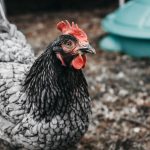Bears are formidable predators that pose a significant threat to chickens and other small livestock. Their keen sense of smell allows them to detect food sources from considerable distances, making poultry particularly vulnerable. Once bears identify a food source, they often return to the same location repeatedly.
Bears are opportunistic feeders, readily exploiting any accessible food source. An inadequately secured chicken coop presents an attractive target for these animals. When attempting to access food, bears can cause extensive damage to structures and property due to their size and strength.
The combination of bears’ powerful physique, acute olfactory abilities, and opportunistic feeding behavior makes them a persistent danger to chicken flocks. Their potential to cause both livestock loss and property damage necessitates robust protective measures for poultry keepers in bear-inhabited areas.
Table of Contents
- 1 Securing the coop: Tips for bear-proofing your chicken enclosure
- 2 Deterrents and repellents: Effective ways to keep bears away from chickens
- 3 Proper waste management: How to minimize attractants for bears
- 4 Monitoring and surveillance: Keeping an eye on bear activity around your property
- 5 Dealing with repeat offenders: What to do if bears continue to target your chickens
- 6 Seeking professional help: When to call in wildlife experts for bear management
- 7 FAQs
- 7.1 What are some effective ways to keep bears away from chickens?
- 7.2 Why is it important to keep bears away from chickens?
- 7.3 What are some signs that bears may be targeting chickens?
- 7.4 Are there any legal regulations regarding bear deterrents for protecting chickens?
- 7.5 What should I do if I encounter a bear near my chicken coop?
Key Takeaways
- Bears pose a threat to chickens due to their opportunistic nature and strong sense of smell
- Securing the coop with electric fencing, sturdy materials, and secure latches can help bear-proof the chicken enclosure
- Deterrents such as motion-activated lights, noise makers, and bear spray can effectively keep bears away from chickens
- Proper waste management, including securing garbage and compost, can minimize attractants for bears
- Regular monitoring and surveillance of bear activity around the property is crucial for early detection and prevention of chicken predation
- If bears continue to target chickens, it may be necessary to seek professional help from wildlife experts for bear management
- Calling in wildlife experts is essential when dealing with repeat bear offenders to ensure the safety of both chickens and humans
Securing the coop: Tips for bear-proofing your chicken enclosure
Building a Bear-Proof Coop
When it comes to protecting your chickens from bears, it is essential to take proactive measures to secure your coop and prevent these powerful predators from gaining access to your flock. One of the most effective ways to bear-proof your chicken enclosure is by using heavy-duty materials such as metal or reinforced wood for the construction of your coop. Bears are incredibly strong and can easily break through flimsy materials, so it is crucial to invest in a sturdy and secure structure that can withstand their attempts to gain entry.
Securing Doors and Windows
In addition to using strong materials, it is also important to reinforce the doors and windows of your coop with heavy-duty locks and latches. Bears are known for their ability to pry open doors and windows, so it is crucial to use secure locking mechanisms that will prevent them from gaining access to your chickens.
Deterrents and Alarms
It is also recommended to install motion-activated lights and alarms around your coop to deter bears from approaching the area. These deterrents can help scare off bears before they have a chance to get close to your chickens.
Deterrents and repellents: Effective ways to keep bears away from chickens

In addition to securing your coop, there are several effective deterrents and repellents that can help keep bears away from your chickens. One popular option is the use of electric fencing, which can deliver a mild shock to bears that attempt to approach your coop. This can be an effective way to deter bears from getting too close to your chickens without causing them any harm.
Another option is the use of bear-specific repellents, which can be sprayed around the perimeter of your coop to create a barrier that bears will be reluctant to cross. Another effective deterrent is the use of noise-making devices such as air horns or bear bells, which can startle bears and scare them away from your property. Additionally, keeping a clean and tidy yard can also help deter bears, as they are less likely to approach an area that does not have any potential food sources.
By implementing these deterrents and repellents, you can create a protective barrier around your chickens that will help keep bears at bay.
Proper waste management: How to minimize attractants for bears
Proper waste management is crucial when it comes to minimizing attractants for bears and reducing the risk of them targeting your chickens. Bears are attracted to food sources, so it is important to properly manage any waste or food scraps that could potentially attract them to your property. This means securely storing garbage in bear-proof containers and disposing of any food waste in a way that does not attract bears.
It is also important to clean up any spilled bird feed or other potential food sources around your property to minimize the risk of attracting bears. In addition to managing waste, it is also important to secure any other potential attractants for bears, such as pet food or livestock feed. These items should be stored in bear-proof containers or in secure buildings that are inaccessible to bears.
By properly managing waste and other potential attractants, you can significantly reduce the risk of bears targeting your chickens and other livestock.
Monitoring and surveillance: Keeping an eye on bear activity around your property
Keeping a close eye on bear activity around your property is essential for protecting your chickens from these powerful predators. This can be done through the use of trail cameras, which can be strategically placed around your property to monitor bear activity. By keeping an eye on bear movements, you can take proactive measures to protect your chickens before bears have a chance to target them.
In addition to using trail cameras, it is also important to be vigilant about any signs of bear activity around your property, such as tracks or scat. By staying aware of bear movements in your area, you can take proactive measures to secure your coop and protect your chickens from potential threats. By monitoring and surveilling bear activity around your property, you can stay one step ahead of these powerful predators and keep your flock safe.
Dealing with repeat offenders: What to do if bears continue to target your chickens

Non-Lethal Deterrents
One option is to use non-lethal deterrents such as rubber bullets or bean bag rounds to scare off bears without causing them harm. These deterrents can be effective in teaching bears that your property is not a source of easy food and can help discourage them from targeting your chickens.
Seeking Professional Assistance
In some cases, it may be necessary to seek assistance from wildlife authorities or conservation officers who can help address the issue of repeat bear offenders. These professionals can provide valuable guidance on how to effectively deter bears from targeting your chickens and may also be able to assist with relocating problem bears if necessary.
Effective Solutions
By taking proactive measures and seeking professional assistance, you can effectively deal with repeat bear offenders and protect your chickens from ongoing threats.
Seeking professional help: When to call in wildlife experts for bear management
If you find that you are unable to effectively manage bear threats on your own, it may be necessary to seek professional help from wildlife experts who specialize in bear management. These professionals have the knowledge and experience needed to effectively address bear threats and can provide valuable guidance on how to protect your chickens from these powerful predators. They can also assist with implementing effective deterrents and repellents that will help keep bears away from your property.
In addition to providing guidance on bear management, wildlife experts can also assist with addressing any underlying issues that may be attracting bears to your property. This may include conducting a thorough assessment of potential attractants and providing recommendations on how to minimize these risks. By seeking professional help, you can gain valuable insight into effective bear management strategies and take proactive measures to protect your chickens from ongoing threats.
If you’re looking for more tips on keeping your chickens safe, check out this article on The Chicken Coop Country Diner. It offers valuable insights on how to create a secure and comfortable environment for your chickens, which can also help keep bears away from your flock.
FAQs
What are some effective ways to keep bears away from chickens?
Some effective ways to keep bears away from chickens include installing electric fencing, using motion-activated lights or sound deterrents, securing chicken coops with sturdy locks, and removing any potential food sources that may attract bears.
Why is it important to keep bears away from chickens?
It is important to keep bears away from chickens to protect the safety of both the chickens and the humans who care for them. Bears can pose a threat to the well-being of chickens and can also cause property damage.
What are some signs that bears may be targeting chickens?
Signs that bears may be targeting chickens include evidence of attempted entry into chicken coops, missing or injured chickens, and tracks or scat near the chicken coop.
Are there any legal regulations regarding bear deterrents for protecting chickens?
Regulations regarding bear deterrents for protecting chickens may vary by location. It is important to check with local wildlife authorities or conservation agencies to ensure that any deterrent methods used are in compliance with applicable laws and regulations.
What should I do if I encounter a bear near my chicken coop?
If you encounter a bear near your chicken coop, it is important to remain calm and avoid approaching the bear. Back away slowly and give the bear plenty of space. It is also advisable to contact local wildlife authorities for guidance on how to handle the situation.
Meet Walter, the feathered-friend fanatic of Florida! Nestled in the sunshine state, Walter struts through life with his feathered companions, clucking his way to happiness. With a coop that’s fancier than a five-star hotel, he’s the Don Juan of the chicken world. When he’s not teaching his hens to do the cha-cha, you’ll find him in a heated debate with his prized rooster, Sir Clucks-a-Lot. Walter’s poultry passion is no yolk; he’s the sunny-side-up guy you never knew you needed in your flock of friends!







